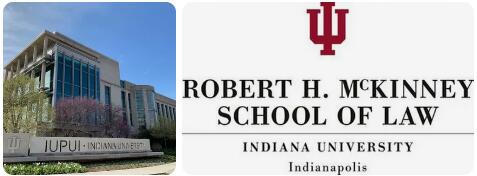Indiana University–Indianapolis School of Law is a public law school located in Indianapolis, Indiana. Established in 1902, the school was originally known as the Indiana Law School. It was originally located on the campus of Butler University, but was moved to its current location on Indiana Avenue in 1929. In 1969, the school merged with Indiana University and became known as the Indiana University-Indianapolis School of Law. The school has since become one of the leading institutions for legal education in the Midwest, offering a number of degree programs and concentrations for students interested in pursuing a career in law. The school is also home to several student organizations and clinics that provide students with opportunities to gain real-world experience while attending classes. In addition, IU-Indianapolis School of Law offers several certificate programs that allow students to specialize their studies further, such as certificates in intellectual property and health care law. IU-Indianapolis offers an excellent faculty with many members being recognized nationally and internationally for their contributions to legal scholarship. Additionally, graduates from IU-Indianapolis have gone on to successful careers as attorneys at some of the most prestigious firms and organizations around the world.
Indiana University–Indianapolis School of Law is located in the state of Indiana. As one of the leading law programs, Indiana University–Indianapolis School of Law has a high average LSAT score of 154-160 when recruiting new students. As a return, the median starting salary for law graduates reaches $80,500 per year. See the following table for detailed admissions information and career profiles of Indiana University–Indianapolis School of Law.
Admissions: Indiana University–Indianapolis
Indiana University–Indianapolis School of Law is a highly competitive law school that has a rich history of excellence in legal education. The admissions process is rigorous and designed to identify the best and brightest applicants for admission. The average GPA for admitted students is 3.62, with the 75th percentile being 3.86 and the 25th percentile being 3.36. The median LSAT score for admitted students is 154, with the 75th percentile being 158 and the 25th percentile being 151. The acceptance rate is 41%, which is higher than other similarly ranked law schools in the country. Additionally, IUPUI Law values diversity in its student body and encourages applications from underrepresented groups such as racial minorities, first-generation college students, LGBTQ+ individuals, military veterans, and individuals with disabilities or medical conditions. In order to maximize the diversity of its student body, IUPUI Law offers a number of scholarships specifically designed to support underrepresented groups. Furthermore, IUPUI Law offers numerous resources to ensure that all students receive an excellent legal education regardless of their background or financial situation.
| Fall 2019 Admissions and Enrollment Statistics | |
|---|---|
| Total number of full- and part-time applicants | 1,766 |
| Total number of full- and part-time acceptances | 710 |
| Overall acceptance rate | 40.2% |
| Total number of full- and part-time first-year students enrolled | 297 |
| Number of full-time program applicants | 1,513 |
| Number of full-time program acceptances | 570 |
| Full-time acceptance rate | 37.7% |
| Number of first-year full-time students enrolled | 195 |
| Number of part-time program applicants | 253 |
| Number of part-time program acceptances | 140 |
| Part-time acceptance rate | 55.3% |
| Number of first-year part-time students enrolled | 102 |
| Fall 2019 GPA and LSAT Scores | |
| 25th-75th percentile GPA scores for all students | 3.15-3.7 |
| 25th-75th percentile LSAT scores for all students | 151-159 |
| 25th-75th percentile undergraduate GPA for full-time students | 3.23-3.73 |
| 25th-75th percentile LSAT scores for full-time students | 154-160 |
| 25th-75th percentile undergraduate GPA for part-time students | 3.04-3.56 |
| 25th-75th percentile LSAT scores for part-time students | 147-155 |
Careers: Indiana University–Indianapolis
| Bar Statistics (Winter and Summer 2018 administrations) | |
|---|---|
| State where the greatest number of first-time test takers took the bar | IN |
| School’s bar passage rate for first-time test takers | 83.8% |
| Statewide bar passage rate for first-time test takers | 84.4% |
| Class of 2018 Graduates | |
| Total graduates | 284 |
| Graduates employed at graduation | 72.2% |
| Graduates known to be employed nine months after graduation | 96.1% |
| Starting Salaries of 2018 Graduates Employed Full-time | |
| 25th percentile private sector starting salary | $52,000 |
| Median private sector starting salary | $80,500 |
| 75th percentile private sector starting salary | $100,000 |
| Percent in the private sector who reported salary information | 43% |
| Median public service starting salary | $46,112 |
| Areas of Legal Practice (Class of 2018) | |
| Percent employed in academia | 4.0% |
| Percent employed in business and industry | 19.0% |
| Percent employed in government | 18.0% |
| Percent employed in all judicial clerkships | 1.0% |
| Percent employed in law firms | 53.0% |
| Percent employed in public interest | 5.0% |
| Percent employed in an unknown field | 0.0% |
| Percent employed in a judicial clerkship by an Article III federal judge | 1.0% |
| 2018 Graduates Employment Location | |
| Graduates employed in-state | 80% |
| Graduates employed in foreign countries | 0.5% |
| Number of states where graduates are employed | 22 |
| New England (CT, ME, MA, NH, RI, VT) | 0.4% |
| Middle Atlantic (NY, NJ, PA) | 0.6% |
| East North Central (IL, IN, MI, OH, WI) | 89.5% |
| West North Central (IA, KS, MN, MO, NE, ND, SD) | 0.4% |
| South Atlantic (DE, DC, FL, GA, MD, NC, SC, VA, WV) | 2.6% |
| East South Central (AL, KY, MS, TN) | 1.5% |
| West South Central (AR, LA, OK, TX) | 1.5% |
| Pacific (AK, CA, HI, OR, WA) | 1.1% |
| Mountain (AZ, CO, ID, MT, NV, NM, UT, WY) | 1.9% |
| Employment location unknown | 0.0% |
| Career Services | |
| (Data appear as originally submitted by this school) | |
| Career services operations | The mission of the Office of Professional Development is to assist our law students and alumni with all aspects of the job search process. We assist students and alumni on their journeys to find where they fit into the profession. Programs include networking mixers and luncheons with members of the bar, panel discussions, resume review and one-on-one counseling, and electronic job posting. |
| Job Type | |
| Bar admission required or anticipated (e.g., attorney and corporate counsel positions, law clerks, judicial clerks) | 75.0% |
| J.D. preferred, law degree enhances position (e.g., corporate contracts administrator, alternative dispute resolution specialist, government regulatory analyst, FBI special agent) | 12.0% |
| Professional/other (jobs that require professional skills or training but for which a J.D. is neither preferred nor particularly applicable; e.g., accountant, teacher, business manager, nurse) | 11.0% |
| Nonprofessional/other (job that does not require any professional skills or training or is taken on a temporary basis and not viewed as part of a career path) | 2.0% |









